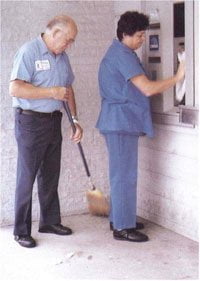“Outsourcing of public services to the
private and voluntary sectors has almost doubled to close to £80bn in little
more than a decade and makes up a far larger part of the economy than
previously thought.” (Financial Times 09.07.08) A third of all public services – far
more than previously thought – are now delivered by the private and voluntary
sectors, according to this report commissioned by the government.
The
FT goes on, “The market is worth £79bn, employs almost as many people as the
NHS and accounts for 6 per cent of gross domestic product, making it a larger
industrial sector than pharmaceuticals, automotive or electricity, gas and
water.” The study shows that health is the largest sector of the public
services industry, accounting for £24bn of spending last year, followed by
social protection – which comprises unemployment, housing, disability and old
age – at just less than £18bn, defence at £10bn and education at just under
£7.5bn. The study by
DeAnne Julius, an economist and former member of the Bank of England’s
monetary policy committee, shows the public service now embraces everything
from health to waste management, IT, welfare-to-work, training, construction
and legal services.
Julius has
an interesting CV. She goes around hoovering up lucrative posts with private
companies. Until recently she was on the board of Serco which (guess what?)
tenders for public contracts. Could this explain her view that, "Twenty
years ago, too many things were being done in the public sector; it ossified"?
Previously she was on the Monetary
Policy Committee of the Bank of England. And she began her career as an
operative for the CIA. She says she never killed anyone with her bare hands back
then. She was just an economist. Well, good. But she was part of a killing
machine.
Unison, the biggest public sector union, attacked the report, saying her
advisory panel was made up of figures from companies with lucrative public
service contracts. “We need a genuinely independent review of the public
services industry,” said Dave Prentis, Unison’s general secretary, not one that
“simply asks multinational companies what would make their lives easier”.
That’s right, Dave. And this drift to go private means not only that standards
of service will go down, but that your members’ jobs and conditions are on the
line. It’s time to call a halt to this drift.






